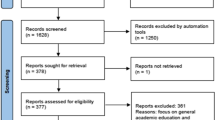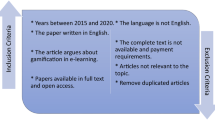Abstract
The effort to develop specific games to help specific learning is a serious and promising endeavor. Like any serious endeavor, it requires application and concentration over generations. The experience of one generation must be made available to help the next avoid certain pitfalls and traps. The author’s experience, which includes some deliberate research and some theorizing, has led him to identify traps that menace the computer game designer, from and for history, but also in other fields. The traps discussed here include going too quickly from good idea to game, the neglect of the variables of time and feedback, the desire to communicate a right answer, the desire to be fun, and the trap of cool technology, particularly the fascination with graphics.
Similar content being viewed by others
References
Caillois, R. (1958), Les jeux et les hommes, (Paris, Gallimard).
Callison, D. (1989), Comparison of Teacher and Student Ratings of Microcomputer Software, Computers in the Schools, 6:1/2, 1989.
Corbeil, P. (1988), History and Electronic Technology: New Tools for New Questions, Simulation/Games for Learning, 18:2 (June 1988).
Corbeil, P. (1991), E Pluribus Unum. Game Review. Simulation & Gaming, 22:2 (June 1991).
Corbeil, P. (1993), Civilization Game Review. Simulation & Gaming, 24:3 (September 1993).
Corbeil, P. (1994), SimHealth Game Review. Simulation & Gaming, 25:4 (December 1994)
Corbeil, P. (1995), The Corporate Game Review, Simulation & Gaming, 26:3 (September 1995).
Corbeil, P. (1999), A Horseless Carriage for the Historian, History Computer Review, 15(2), 31–44.
Corbeil, P. (1997), Review of Kingmaker, Simulation & Gaming, 28:1 (March 1997).
Corbeil, P. (1999a), Learning from the Children: Practical and Theoretical Reflections on Playing and Learning, Simulation & Gaming, 30:2 (June 1999).
Corbeil, P. (2000), Batting.333, or, 10 years out of 30 ain’t bad. Simulation & Gaming 34:1 (March 2000).
Cox, H. (1973), The Seduction of the Spirit, (New York, Simon & Shuster).
Kelleher, J. (1980), Playing with Reality, Northeast Training News (August 1980)
Klabbers, J. (2003), Gaming and Simulation: Principles of a science of design. Simulation & Gaming 34:4 (December 2003).
Laveault, D. & Corbeil, P. (1990), Assessing the Impact of Simulation Games of Learning: A Step-by-Step Approach. Simulation/Games for Learning 20:1 (March 1990)
McDonald, T. (2009), Grassroots Gaming, Maximum PC 14:4 (April 2009).
Meier, S. (1991), Civilization. (Hunt Valley, Maryland, Microprose Software).
Meier, S. (1994), Colonization. (Hunt Valley, Maryland, Microprose Software).
Meier, S. (2005), Civilization IV. (New York, New York, Firaxis and Take-Two Games).
Meier, S. (2008), Civilization IV: Colonization. (New York, New York, Firaxis and Take-Two Games).
Millar, S. La Psychologie du jeu (Paris, Payot: Translation of The Psychology of Play). Copyright ©1968 Penguin Books
Schick, J.B.M. Teaching History with a Computer. Copyright ©1990 Lyceum Books, Chicago, USA
Simonsen, R. (1978), Where does it all end ? Thoughts on the Boundary Lines of the Hobby, Moves 41 (October-November 1978).
Suits, B. (1982), Games and Utopia: Posthumous Reflections. (Paper presented at the 1982 NASAGA Conference.)
Willis, C. Doomsday Book. Copyright ©1992 Bantam Books, NY, USA
Author information
Authors and Affiliations
Additional information
Pierre Corbeil holds degrees from the University of Toronto (Canada) and from the Université de Montréal (Québec). With a career in war gaming, historical games,and inter cultural games, he became interested in entrepreneurship and has published a collection of games on that subject, Entreprendre par le jeu. Recently, he received NASAGA’s coveted Ifill-Raynolds Award for Lifetime Contribution to the field of gaming. He believes games favour invention over classification and defines history as the illusion of reality recreated generation after generation. He still plays war games and writes science fiction novels.
About this article
Cite this article
Corbeil, P. Developing concepts and tools useful to electronic games from and for history. Comput Game J 1, 5–16 (2012). https://doi.org/10.1007/BF03392324
Received:
Accepted:
Published:
Issue Date:
DOI: https://doi.org/10.1007/BF03392324




